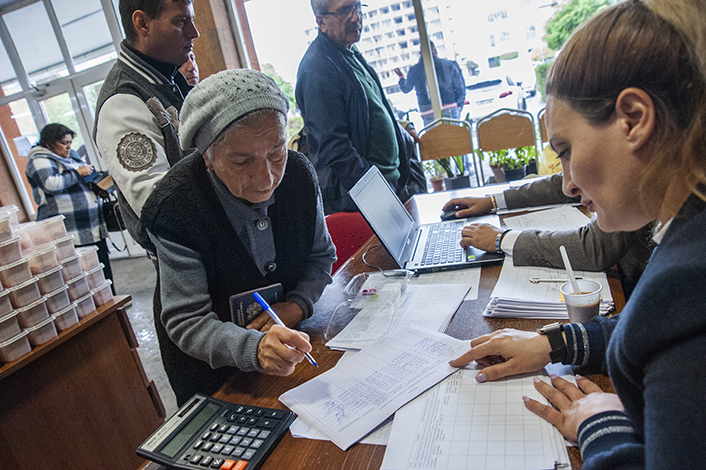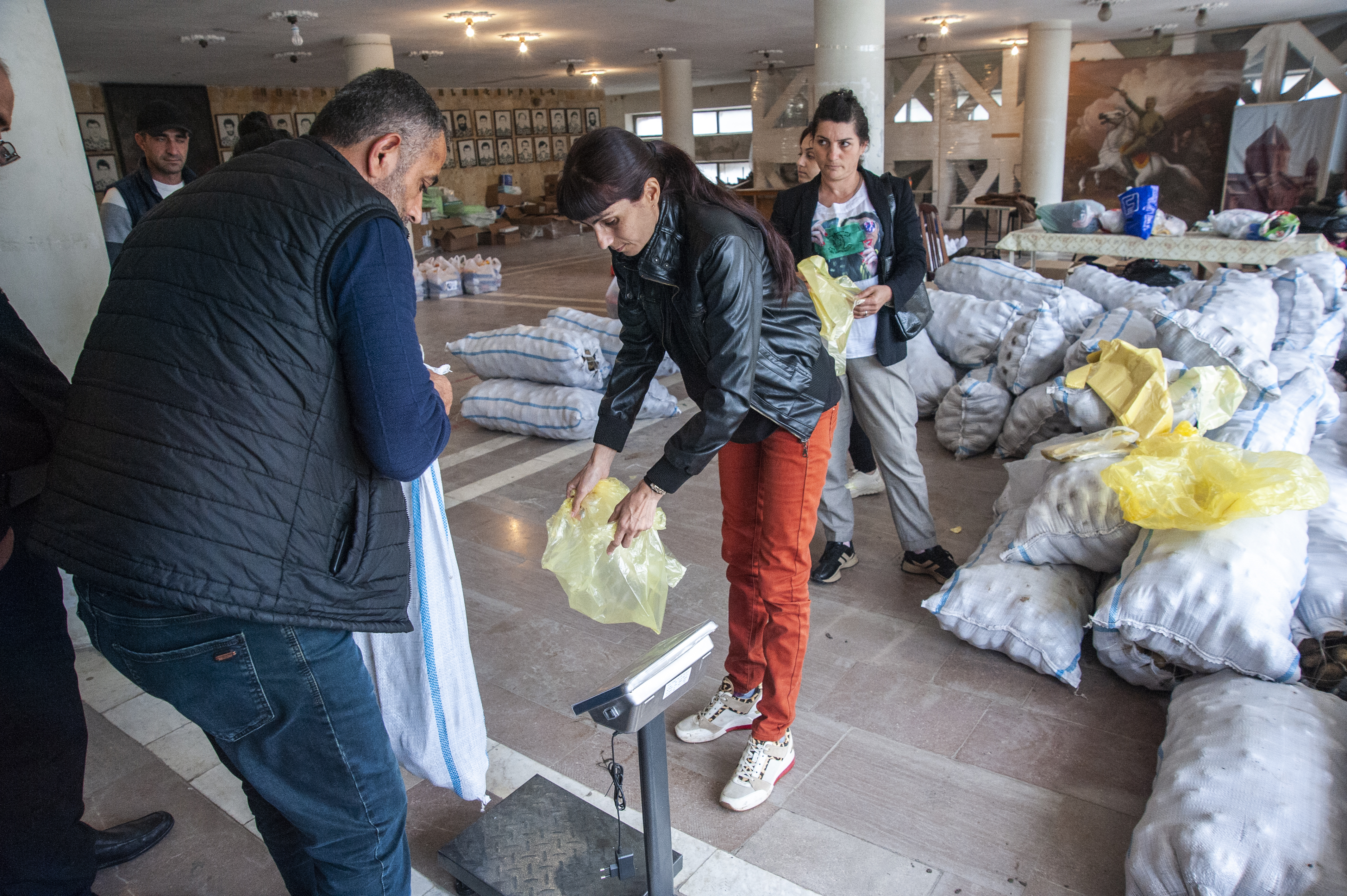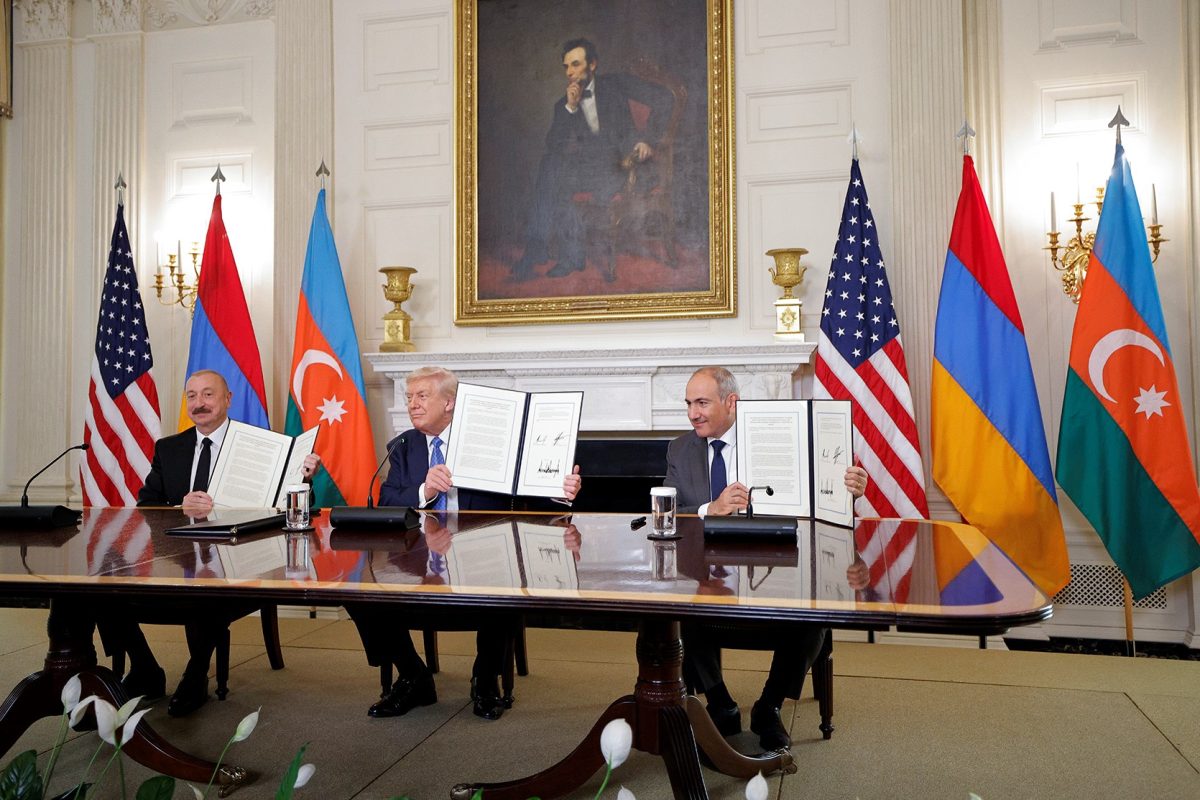On September 19, Azerbaijan launched a military operation against Nagorno-Karabakh. A ceasefire was reached on September 20 as the Nagorno-Karabakh (Republic of Artsakh) administration accepted the conditions. Right after the ceasefire, Karabakh Armenians took refuge in Armenia. After the war that followed the 9-month blockade imposed by Azerbaijan on Nagorno-Karabakh, 100 thousand ethnic Armenians had to leave their homes and took refuge in Armenia along with only a few belongings. Some of the displaced Karabakh (Artsakh) Armenians had a place to go in Armenia. However, a significant portion of them found themselves homeless and without a future. Pakrat Estukyan and Berge Arabian from Agos, travelled throughout Armenia in a one-week journalistic trip, meeting with displaced persons and non-governmental organisations. Agos will publish Estukyan's impressions and Arabian's photos as a series of articles. This week's coverage features interviews and impressions from the third day of the trip to Armenia.
This is our third day meeting with the people forcibly displaced from the Nagorno-Karabakh Republic. Right after breakfast, we set off on our journey with our friend Artak, a businessman from Armenia. Artak is one of the executives of a company manufacturing furniture, kitchenware and industrial products in Armenia. The company he works for has been actively engaged in mobilising aid for Armenians displaced from Nagorno-Karabakh.
Today we will be visiting Artashat, which is much closer to the capital Yerevan in comparison with the city of Goris we visited the day before. In Artashat, we went straight to the municipality, where we were welcomed by Mr. Armen. The moment we met, it became quite clear that he was pretty busy. His cell phone kept ringing all the time; he was constantly telling people on the phone what they needed to do. Amid such hurry, he was also providing us with important explanations. We learned from Armen that there were 1208 families [from Nagorno-Karabakh] now within the administrative jurisdiction of Artashat Municipality, totalling 5300 individuals. All these individuals have been placed in temporary accommodation centres. All school-age children [from Nagorno-Karabakh] continue their education in schools in nearby regions. Three meals are distributed daily. While those staying in the town centre come to the distribution point and receive their food rations in return for a signature, food rations are dispatched to those staying in the villages by vehicles and distributed by the village head.
As Armen was telling us all about these, people were already coming to the municipality building to get their rations for the day. In this way, we found the opportunity to get into direct contact with people. An old couple came quietly. They first collected their food ration, then located their names on the ration list and signed the empty field. They seemed to have come to terms with their circumstances. They had no intention of asking for more, nor did they have the energy to strive to get it. We were hesitant to ask too many questions in fear of hurting their dignity. Our questions might have been overwhelming for these old people. Yet, they still expressed their heartfelt gratitude for the treatment and welcoming approach they received. Who knows, maybe they have relatives or even children in distant lands. I didn't want to bring up these topics. The exhaustion on their faces was quite telling already.
Then we met Lernig. A 41-year-old, strong, sturdy man. He was a welding master. His sorrowful face made him look much older. He shared his story wholeheartedly: “My elder brother and his two sons were gone missing during the explosion at the gas station. My middle brother and his son were there as well. We found him with burns and transferred him by Red Cross ambulance to the burn centre in Yerevan. Unfortunately, despite all efforts, we couldn't save him. Likewise, we have not received any news from his son so far.”
Lernig's biggest concern was finding a house where he can live with his family. He said he would start looking for a job only after solving that problem.
Armen said that there are over 2000 job offerings by the municipality, but at the moment all refugees focus on finding housing.
In another interview, we learned that there was a village house in the Nbarashen region, large enough to host at least two families, yet refugees [from Nagorno-Karabakh] do not want to go there due to its close proximity to [Armenia's] border with Azerbaijan. While we were doing these interviews, a truck from Artak's company entered the parking lot of the municipality, loaded with beds, mattresses, and 'bedding sets'. Artak told us that bedsteads, ready-made beds and bedding sets were the most sought-after necessity items: “We have already provided a lot of bedsteads, but there is still need for more. These are items manufactured by our company, and we continue to deliver them gradually.”
We would confirm Artak's statements in a short while during our next visit to the kindergarten.
It was a rainy day. So, the children in the kindergarten could not play outside and use swings and slides. Yet, the moment we got into the school; we were welcomed by the screams of joy of children aged 5-10. They were racing through the corridors on scooters, which were apparently among donated aid items, and they often collided and tumbled down. No one was injured in these falls, but parents still warned their children to be careful. As we watched the children play, a smile landed on all our faces. Berge was busy photographing the children one after another with great enthusiasm. When we walked past the children's play zone and entered one of the classrooms, the smile was replaced by sadness. A total of 18 people from three families were living in this classroom. Although they were not from the same family, they were close relatives. Their circumstances were quite illustrative of what is defined as displacement or homelessness. The classroom was not adequately ventilated; thus a heavy odour was lurking in the room. Women in the room were in constant motion; there was one older woman though who could not get up from the bed. We would soon find out that she was sick and in need of serious treatment. Apparently, things never worked out quite the way they were supposed to.
As I already noted, the majority of the people in the room were women and each of them had countless stories to tell. Here, too, we heard anecdotes of [displaced] people who locked their door and put the key in their pocket as they left as well as those who did not lock their door so [newcomers] would not force to break it. What we encountered here was something we could anticipate. Such moments inevitably bring to mind the old pages of history. I recalled a visit we made, many years ago, to offer our "congratulations" to people living inside an office block in one of the back streets of Kumkapı [neighbourhood of Istanbul]. This was the story of a father and a son who came to Istanbul with the hope of finding a job but could not find one. While they were here [in Istanbul], the son received the news that his wife had given birth. To celebrate this happy occasion, we visited the building converted from a commercial office block into an apartment hosting refugees from different countries in each room. Not a single visitor had come "empty-handed". Some brought along a box of candies or jelly sweets, others a bottle of raki or cognac. Everything was laid on a sponge bed that was turned into a table by covering aluminium foil. Glasses were filled and emptied one after another, toasts were made wishing the new-born a good life. At that time, we witnessed how people were forced to migrate to foreign hands out of economic hardship and despair. This time, people ended up in the same situation due to an ethnic cleansing operation.
Overwhelmed by reminiscing about all these, I was ready to leave the kindergarten. But then, Berge said there was a family upstairs and they were willing to talk to us. No matter how daunting the task we undertook, we were determined to meet as many people as possible. Yet this second interview left us all in tears. We met a [displaced] family of seven, who had two-storey houses, both in Stepanakert, the capital of the Nagorno-Karabakh Republic, and in a village close to the capital. Their eldest son was a third-year university student at medical school and his education was now interrupted. This was also the case for their daughter. She was attending a [private] college [in Nagorno-Karabakh], but she could not find a corresponding school with the same profile in Artashat. “I don't want to go to a regular high school,” she said. Their father was lamenting that he had to leave everything behind. His other three children were more interested in play rather than school.
There is only way to explain what leaving their country meant for the people of Nagorno-Karabakh: loss of homeland. Repeating after 108 years, this phenomenon has marked a deep fracture in the self-identification of each and every Armenian.
To this day, we feel the deep pain caused by the loss of Western Armenia. The Armenian people are strongly attached to their land. They built and cultivated a culture on the land they called home. In Armenian language, the terms land and homeland are synonymous. Therefore, [for Armenians], there is no difference between loss of homeland and loss of bread.
In this series of interviews, we tried to focus on people's individual traumas rather than political analysis about the issues. However, in addition to individual or family losses, the total toll includes social and national losses. In fact, the people we spoke to felt the need to touch upon this aspect of the issue, in addition to their personal losses. This is where hope or despair reveals itself. While some still want to believe that things will ultimately get better and they will be able return to their ancestral land, others have convinced themselves that Nagorno-Karabakh is now a lost homeland.
(To be continued)
(Chapter one:Hope and despair among Karabakh Armenians)
(Translation: Burcu Becermen)





